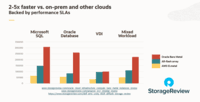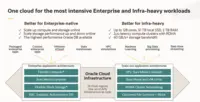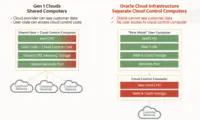Overview
What is Oracle Cloud Infrastructure?
Oracle Cloud Infrastructure (OCI) is Oracles's infrastructure-as-a-service (IaaS) platform which combines the utility of public cloud with the granular control, security, and predictability of on-premises infrastructure.
Complete Package of features at optimal cost -- Oracle Cloud Infrastructure.
Didn't go as per expectations
Wonderful product
Oracle
Oracle Cloud Infrastructure - Good Cloud Choice
Overall a very good product
Best Cloud Infrastructure
Very affordable cloud hosting platform out there in the market
Oracle Cloud Infrastructure certification experience
Why to choose Oracle Infrastructure for Database related services.
OCI offers best Cloud experience. Best cloud choice available today
Oracle Cloud Infrastructure Review
Reliable Storage Infastructure
Oracle Cloud Infrastructure: A Gateway to Cloud Excellence
How Oracle Cloud Infrastructure Differs From Its Competitors
Flexibility and Price
Flexibility and Price
Flexibility and Price
Flexibility and Price
Flexibility and Price
Flexibility and Price
Flexibility and Price
Flexibility and Price
Flexibility and Price
Flexibility and Price
Flexibility and Price
Flexibility and Price
Implementation
Decision Factors
Implementation
Decision Factors
Implementation
Decision Factors
Awards
Products that are considered exceptional by their customers based on a variety of criteria win TrustRadius awards. Learn more about the types of TrustRadius awards to make the best purchase decision. More about TrustRadius Awards
Popular Features
- Dynamic scaling (120)8.787%
- Security controls (120)8.686%
- Service-level Agreement (SLA) uptime (120)8.484%
- Monitoring tools (119)8.181%
Reviewer Pros & Cons
Video Reviews
1 video
Pricing
What is Oracle Cloud Infrastructure?
Oracle Cloud Infrastructure (OCI) is Oracles's infrastructure-as-a-service (IaaS) platform which combines the utility of public cloud with the granular control, security, and predictability of on-premises infrastructure.
Entry-level set up fee?
- Setup fee optional
Offerings
- Free Trial
- Free/Freemium Version
- Premium Consulting/Integration Services
Would you like us to let the vendor know that you want pricing?
20 people also want pricing
Alternatives Pricing
What is Microsoft Azure?
Microsoft Azure is a cloud computing platform and infrastructure for building, deploying, and managing applications and services through a global network of Microsoft-managed datacenters.
What is IBM Cloud Internet Services?
IBM Cloud Internet Services is a set of edge network services for securing internet-facing applications from DDoS attacks, data theft, and bot attacks, as well as optimizing their web apps or ensuring global responsiveness and the ongoing availability of their internet-facing applications.
Product Demos
OCI First Principles: Inside OCI Engineering
Features
Infrastructure-as-a-Service (IaaS)
IaaS provides the basic building blocks for an IT infrastructure like servers, storage, and networking, in an on-demand model over the Internet
- 8.4Service-level Agreement (SLA) uptime(120) Ratings
The service uptime as a percentage defined in the SLA
- 8.7Dynamic scaling(120) Ratings
Ease of scaling up or down in response to customer needs
- 8.7Elastic load balancing(111) Ratings
Automatic balancing and distribution of resources across multiple virtual computers
- 8Pre-configured templates(109) Ratings
Pre-defined templates for virtual machines
- 8.1Monitoring tools(119) Ratings
Monitoring tools provide alerts when problems are detected
- 7.7Pre-defined machine images(108) Ratings
Range of different server configurations available
- 7.8Operating system support(119) Ratings
Range of operating systems available as pre-configured images
- 8.6Security controls(120) Ratings
Compliance with security protocols like SSL and AES
- 8.3Automation(84) Ratings
Automation of administrative tasks
Product Details
- About
- Integrations
- Competitors
- Tech Details
- Downloadables
- FAQs
What is Oracle Cloud Infrastructure?
Solutions from containers to VMware to AI, offered through a common set of 100+ services in each OCI region, across clouds, or in a data center with consistent pricing worldwide. OCI can be used to migrate, modernize, build, and scale all workloads, including existing and new applications and data platforms.
Users can develop intelligent applications with a choice of open-source tools, such as Java, the programming language for cloud native development, and MySQL, the world’s most popular open-source database. Oracle boasts a strong commitment to the open-source community and directly support Hadoop, Kubernetes, Linux, and Python.
OCI spans 46 interconnected commercial and government cloud regions across the globe. For increased support of customer cloud strategies, Oracle Cloud also offers a full suite of Oracle Cloud Applications and direct interconnection with Microsoft Azure.
Oracle Cloud Infrastructure Features
Infrastructure-as-a-Service (IaaS) Features
- Supported: Service-level Agreement (SLA) uptime
- Supported: Dynamic scaling
- Supported: Elastic load balancing
- Supported: Pre-configured templates
- Supported: Monitoring tools
- Supported: Pre-defined machine images
- Supported: Operating system support
- Supported: Security controls
- Supported: Automation
Additional Features
- Supported: Application Development
- Supported: Artificial Intelligence (AI) and Machine Learning (ML)
- Supported: Analytics
- Supported: Big Data
- Supported: Developer Services
- Supported: Containers and Functions
- Supported: Data Lake
- Supported: Database Platform
- Supported: Database Services
- Supported: Distributed Cloud
- Supported: Integration Services
- Supported: Open Source Databases
- Supported: Security Services
- Supported: Storage Services
- Supported: VMware
Oracle Cloud Infrastructure Screenshots
Oracle Cloud Infrastructure Video
Oracle Cloud Infrastructure Integrations
- Microsoft Azure
- VMware
- Oracle Applications
- SAP
- AWS
Oracle Cloud Infrastructure Competitors
Oracle Cloud Infrastructure Technical Details
| Deployment Types | On-premise, Software as a Service (SaaS), Cloud, or Web-Based |
|---|---|
| Operating Systems | Windows, Linux |
| Mobile Application | Apple iOS, Android |
| Supported Languages | Arabic, Chinesea, Croatian, Czech, Danish, Dutch, English, Finnish, French, German, Greek, Hebrew, Hungarian, Italian, Japanese, Korean, Norwegian, Polish, Portuguese, Romanian, Russian, Slovak, Slovenian, Spanish, Swedish, Thai |
Oracle Cloud Infrastructure Downloadables
Frequently Asked Questions
Comparisons
Compare with
Reviews and Ratings
(352)Attribute Ratings
- 8.5Likelihood to Renew4 ratings
- 9Availability1 rating
- 8Performance13 ratings
- 7.6Usability13 ratings
- 8.4Support Rating17 ratings
- 9.1Online Training2 ratings
- 9.1In-Person Training2 ratings
- 9.1Implementation Rating2 ratings
- 8Configurability1 rating
- 7Product Scalability1 rating
- 7Ease of integration1 rating
- 8Vendor pre-sale1 rating
- 8Vendor post-sale1 rating
- 7.3Oracle Implementation Satisfaction8 ratings
- 7.8Oracle University Experience19 ratings
- 8Professional Services5 ratings
- 7.3Contract Terms and Pricing Model9 ratings
Reviews
(1-25 of 125)Good infrastructure on a reasonable price.
- VCN is excellent for limiting the port attack vector.
- Free tier gave us a quick test of what we could do.
- The offer of arm and x86 cpu gave us options to optimize our work.
- More Linux images.
- VCN could have more tools to check how much traffic is going through an specific port.
- Updated guides (current ones are a little bit stale).
- Scalability: During peak hours, you do not need to add additional servers, load balancers, etc., manually. Oracle does everything for you.
- Cost : It's amazing option of pay what you use really helped us.
- Interoperability: As we migrated from On-Premise, its interoperability helped reduce the time for go live.
- Marketplace : A better and enhanced marketplace for prebuilt/ custom application.
- UI/UX: There is not much to change, but if the team can check customer feedback on the Support portal, there are many options that will make it even more amazing.
- Cost: We love the dynamic pricing, but for a midsize firm, it's still a lot, so if plans can be drilled down further, that could be useful.
Didn't go as per expectations
- You can create multiple machines and they don't restrict you to 1 instance at a time during trial.
- Large range of operating system images are provided by them with customization
- Memory IOPS are better.
- They really needs to improve their User Interface
- Information on website is very confusing
- No proper listing of recently used service
- As of now services are very limited
Wonderful product
- We are able to cut down the total infrastructure cost
- Easy to use
- Easy to migrate
- More services
- Custom environment and configuration
Oracle
- Their Pricing is fair and very attainable
- Has tons of storage available for our usage
- Tons of integration services
- More cloud regions
- Minor performance issues
- Occasionally slow loading
Oracle Cloud Infrastructure - Good Cloud Choice
- Good Performing VMs with high CPUs
- Databases can hold large number of connections concurrely
- Applications perform overall better for speed
- VMs are good but proper configuration as per application load has to be planned
- Databases are very good specially in case Oracle but more opensource integrations can add value
- Continuous Delivery automated pipeline will be great option
Overall a very good product
- Great performance. It is delivering high speed computing and storage capabilities which is crucial for increasing workloads.
- Offers robust security.
- Seamless integration with on-premises infrastructure
- User interface can be improved.
- More tools for developer can be added to make development game changing.
- Regional availability can be improved.
Best Cloud Infrastructure
- Security while transferring data to third party vendor applications
- on premis VPN support
- steep learning curve for beginners
- Easy to set up and run a VM
- Super support to deploy the applications in real-time
- Easy to set up and configure
- Great documentation of various steps
- Difficulty in deploying applications for various regions
- There is very hard pre built images for various OS
- Less support for Linux based applications
Oracle Cloud Infrastructure certification experience
- Lots of documentation
- Robust security principles
- Too much documentation
- Documentation a little too reference-style
- Long turnaround for inquiries
Robustness seemed clear, but a lot of config files to deal with.
- Compute Options.
- Networking
- Applications
- More Services.
- Custom Environment and Configuration.
- love the oci console , its very simple to use than before.
- oci rewards system is pretty interesting.
- oci security much better than other OEM's.
- Though the navigation has been simplified a lot I believe it can be simplified more just like AWS.
- cost details analysis gets delayed sometimes. This needs to settle.
- More insights on offerings of different services provided in OCI
Oracle Cloud Infrastructure Review
- Database Management is really easy
- It is good for large amount of data
- It has a good backup and failover policies
- Its Pricing is bit high
- Knowledge is required to work on it
It is less suited for small-sized data requirements as the cost to output is low.
Reliable Storage Infastructure
- User Friendly
- Simple to Use
- Scalability
- Reliability
- Cost efficiency
- Start up Guides
- Ease of setup
- Ease of integration
Oracle Cloud Infrastructure: A Gateway to Cloud Excellence
We use for a wide variety of use cases, such as hosting web applications, running databases and processing large data sets.
- Database Management
- High-Performance Computing
- Scalability
- Big Data and Analytics
- Data Backup and Disaster Recovery
- Pricing and Transparency
- User Interface and Usability
- Documentation and Support
- Third-Party Integrations
- Hybrid Cloud Solutions
Scenarios Where Oracle Cloud Infrastructure May Be Less Appropriate are Non-Oracle Workloads, Minimal Global Presence, Preference for Simplicity and Small to medium-sized with Simpler Needs
- Disaster Recovery Plan Management
- Cloud Storage
- Cloud Database Management
- Customer support is lacking in my opinon
- I've found the initial integration can be confusing
- Need more apps overall
Oracle Cloud Infrastructure Review
- Low on Cost
- Easy to use
- Right scaling is convenient
- Convenient to operate Managed Services
- Security aspects
- User Experience is not great
- At times face downtime while loading the windows
My honest review of Oracle Cloud Infrastructure.
- High Scalability.
- Good Security.
- Top notch performance.
- Good manageability.
- Support needs improvement.
- It’s not east to integrate.
- Documentation is little hard to understand.
Low Cost, High Performance Cloud Platform.
- Good Internet Connectivity at Low Price.
- Flexible Compute Resource Allocation.
- Pricing
- Simplified Console or API (Flow) for Small Organization.
OCI - Where Next Happens !!!
We have been using Oracle Database since more than 2 decades now and now as we have started our Cloud Journey the migration have been very smooth with its innovative tools and services.
- Very Cost Effective
- Better SLA
- Best Database Services
- Oracle Workload Optimization
- Support Ticket Creation and Followup
- Compared to other Cloud Service Providers like AWS, still lacking in providing many innovative products and solutions
- Administrative Portal needs to made more user-friendly
2. Best for high-performance computing which could run multiple complex simulations along with artificial intelligence as an additional addon.
3. Very well suited for the pricing factors as it has much cheaper rates compared to its competitors (though needs lacks a bit of flexibility).
Oracle Cloud Infrastructure: A Diamond in the Rough
- For apps driven by events or micro-services, Oracle Functions by Oracle Cloud Infrastructure presents a serverless computing choice. It lets programmers bypass server management when running code, streamlining app development, and deployment.
- The Oracle Cloud Infrastructure high-performance computing is suited to a compute-intensive and large data workload. The other type is a dedicated compute-optimised instance which contains a GPU that is useful for deep learning, image processing, and scientific computations. Such resources help in quick computing and learning of models inside the organization.
- Self-driving, self-securing, and self-healing database services that come under Oracle Cloud Infrastructure autonomous database services include autonomous data warehouse and transaction processing. Database task automation can encompass regular optimization of various routines, enhancement of a DBMS, and assurance of integrity and uninterrupted access to the database.
- Pricing: While Oracle offers competitive pricing, I personally find it challenging to understand their billing statements due to complex pricing models.
- User Interface: I did not find its UI intuitive or user-friendly compared to competitors.
- Integration: Oracle Cloud Infrastructure does not provide direct service integrations with other cloud providers or with services which makes it more challenging for the users.
Cost effective cloud infrastructure platform!
- High-performance workload execution and management.
- Application load balancing and scale options.
- Flexible and low total cost of ownership.
- Documentation is sometimes not up to date and requires professional services to set things straight.
- Better cost management support - Continued automation in this area will be beneficial.
- Support an overhaul of issue submission and tracking - Operational aspects.
A cost affective way to start cloud journey!
- Database services.
- Logging
- In database machine learning.
- OCI Workflow.
- Support is not up to the mark.
- Limited options for OS images for VM.
- UI can be improved to match the competition.
- A limited number of services offered.
Great Cloud Alternative from a legacy software powerhouse!
- The auto-scaling feature in Oracle Cloud Infrastructure is extremely useful during sudden spikes in volumes being processed. The load balancer works seamlessly and is easy to set up.
- Data storage and security.
- Monitoring dashboard.
- Global footprint is lacking as compared to competitors.
- Integration with more cloud solutions needed(e.g. AWS).
- Support is lacking a bit: slow response and lack of a wide community to help resolve issues.
Scalable, sturdy database infra
We use the Oracle 12c and 19c databases exhaustively for our purposes
- Oracle offers a cloud solution for database hosting available across multiple tiers which can be scaled vertically catering to various data sizes.
- Support is complete, quick and efficient
- Helpful to effect migrations from OnPrem to cloud with minimal downtime
- Largely supports SQL databases only, forcing us to find separate solutions for Mongo, Redis or similar DB providers
- The setup is complex and antiquated, requiring significant training and upkeep
- Connection into local instances is tough and often unstable, leading to significant effort spent for local testing














